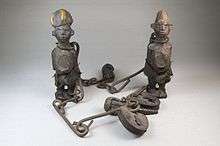Kumina
| Kumina | |
|---|---|
| Classification | Afro-Jamaican |
| Region | Saint Thomas Parish, Jamaica |
| Origin |
Post-Abolition era Jamaica |
| Separations | Kongo, Machunde, Mondongo, Moyenge, Igbo, Yoruba |
Kumina is an Afro-Jamaican religion and practices that include secular ceremonies, dance and music that developed from the beliefs and traditions brought to the island by BaKongo enslaved people and indentured labourers, from the Congo region of West Central Africa, during the post-emancipation era.[1] Is mostly associated with the parish of St. Thomas in the east of the island. However, the practice spread to the parishes of Portland, St. Mary and St. Catherine, and the city of Kingston.[2]
Kumina also gives it name to a drumming style, developed from the music that accompanied the spiritual ceremonies, that evolved in urban Kingston. The Kumina drumming style has a great influence on Rastafari music, especially the Nyabinghi drumming, and Jamaican popular music. Count Ossie was a notable pioneer of the drumming style in popular music and it continues to have a significant influence on contemporary genres such as reggae and dancehall.[3]
The Kumina riddim is a dancehall riddim produced by Sly & Robbie in 2002. It has featured in recordings of over 20 artists including Chaka Demus & Pliers and Tanya Stephens.[3]
Beliefs
| Part of a series on |
| Kongo religion |
|---|
 |
| Theology and concepts |
| Derivatives |
Spirits are separated into sky bound and earth bound deities. Oto King Zombi is the Supreme Creator. Other sky bound spirits of Kumina are Obei and Shango. Earth bound spirits in Kumina are found in the Old Testament David, Ezekiel, Moses, Cain, and Shadrak. Ancestral spirits are also important in Kumina. The term used to refer to these ancestral spirits is Zombi, the term originates from the Kikongo word "dzambi". Only a person who has been possessed by a Zombi can become a Zombi after death. A Zombi had the privilege of returning to earth to preside over ceremonies and possess dancers and performing other duties. Unlike people who had been possessed by Zombies, those who had not been possessed would simply die and ascend to Oto King Zombi without chance of returning to earth.
Organization
Organization of Kumina communities follows the general local character of African religions in Jamaica. Kumina communities are small family based communities or nations. Some nations include Mondongo, Moyenge, Machunde, Kongo, Igbo, and Yoruba. People from Kumina families are given the title Bongo. Marrying into a Bongo family is one avenue to become a part of a Kumina nation; special initiation is the other avenue. Kumina nations are led by a "King" and "Queen". Imogene "Queenie" Kennedy AKA Queenie III (c1920-1998) was a well-known Kumina Queen in the 20th century, born in St Thomas in the late 1920s she later moved to Kingston and then Waterloo, St Catherine.[4]
References
- ↑ Stewart, Dianne M. (2005-07-07). Three Eyes for the Journey: African Dimensions of the Jamaican Religious Experience. Oxford University Press. ISBN 9780198039082.
- ↑ Murrell, Nathaniel Samuel (2010-01-25). Afro-Caribbean Religions: An Introduction to Their Historical, Cultural, and Sacred Traditions. Temple University Press. ISBN 9781439901755.
- 1 2 Ryman, Cheryl (2014). "Kumina". In Horn, David; Shepherd, John. Bloomsbury Encyclopedia of Popular Music of the World, Volume 9: Genres: Caribbean and Latin America. Bloomsbury Publishing. ISBN 9781441132253.
- ↑ "Kumina Queen's Drum Repatriated To Jamaica". Jamaican Gleaner. 3 August 2014. Retrieved 5 December 2016.